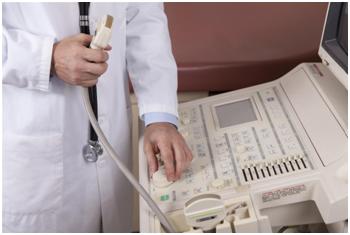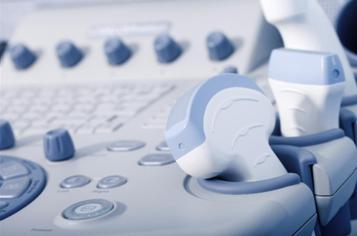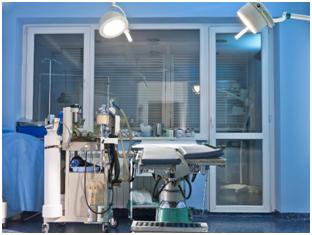|
Maintenance Extends Ultrasound Life, Representing Big Savings Ultrasound machines provide an invaluable service to the health care industry by offering an accurate and non-invasive imaging tool that can help in monitoring patient health and diagnosing conditions. Like any other medical device, ultrasound machines require regular inspection and maintenance to extend their longevity and ensure their ability to function properly.
Ultrasound devices use ultrasound waves to develop images of the bodys internal organs and processes. Ultrasound machines use a device called a transducer to generate high frequency soundwaves which they focus on specific areas of the body. The echoes these soundwaves make as they bounce off of internal organs come back to the device and are used to create images. Ultrasound has a variety of uses. It is most commonly associated with pregnancy care, being used to monitor the development of fetuses. Ultrasound is used to determine an unborn childs sex and is also used to detect potential birth defects or problems such as breech positioning or placental issues. Expectant parents often get print-outs of ultrasound images of their child as keepsakes, as it provides their first look at their child.
Ultrasound also plays an important role in diagnosing and monitoring many health conditions, such as diseases affecting the heart, liver, gallbladder, spleen, and other soft tissues. Some physicians use ultrasound to identify and treat soft tissue injuries. Rising Ultrasound Device Costs Health care providers are under incredible pressure today to cut costs while maintaining the same quality of care. Reducing equipment costs by a strong program of preventative maintenance can help clinics and hospitals save substantial sums in repair and replacement costs. Ultrasound machines are expensive pieces of medical equipment, so keeping them in good working order is an important priority for hospitals and clinics. According to Modern Healthcare, the average price of an ultrasound system is around $115,000. Lower-end systems cost about $25,000, on average, while the most advanced systems cost around $250,000. Prices have increased in recent years as more advanced models have hit the market. That said, ultrasound systems remain less expensive than MRI or CT devices and have the added safety advantage of not using ionizing radiation.
The average life span for an ultrasound device is between six and eight years. Preventative maintenance and proper usage of ultrasound devices can ensure devices hit that mark, and may even help facilities squeeze a few extra years from their ultrasound equipment. Ultrasound Maintenance & Care For healthcare providers seeking to keep their ultrasound devices in top working order for years to come, consider the following tips for preventative ultrasound maintenance:
The manufacturers and vendors of ultrasound devices are usually the most knowledgeable parties concerning these devices and can usually spot problems far in advance. Should you purchase a service agreement, make sure you understand all the terms of the agreement and the services the manufacturer, vendor, or third-party service provider is obligated to render.
Transducers have piezoelectric crystals that generate ultrasound waves when the machine is activated. These ultrasound waves move through the body and bounce off bones, organs, and tissues, and the reflected waves are interpreted by the ultrasound device and used to create images. Damage to transducers will result in the device developing inaccurate images. To maintain the transducer, sonographers and other health care workers using the device should regularly inspect it for cracks on the handle or its other parts. Staff should also carefully check the lens of the device for any cuts, bulges, or dents. Transducers should be stored in cases designed to house them when they are not in use, to avoid damage to the sensitive components of the device.
Because the CPU is the brain of the device, it needs proper care and maintenance. Regular inspections and adjustments are very important to the functionality and longevity of the device. Its also very important to apply all software updates pushed out by the devices manufacturer. Any suspected problems with the CPU need to be addressed immediately to avoid potentially expensive repairs or replacement.
Printing also provides patients with an option to have hard copies of images and other important data. Printers should be checked regularly for basic mechanical function and adequacy of toner, paper, and other necessary supplies. Data storage maintenance should also regularly be performed to ensure data is secure and not corrupted.
Malfunctions of the control panel can result in faulty imaging and difficulty in operating the device. The control panel should be inspected to ensure the keyboard and pointer interface are responsive and working properly. This is a relatively easy portion of necessary maintenance for ultrasound devices.
Reliable Support Although hospital and clinic staff can perform much of the basic preventative care and maintenance necessary to keep ultrasound devices in good working order, occasionally issues arise that require the attention of experts in ultrasound devices. When these situations arise, the original equipment manufacturer or the vendor who sold the facility the device is often the best source of support. That is why finding a reliable seller of ultrasound devices is so important to health care providers.
Hospitals and clinics looking for top quality ultrasound machines can find excellent deals on medical equipment from Medical Device Depot. Medical Device Depot carries a wide inventory of medical devices from respected manufacturers in the industry. The companys sales staff have medical industry backgrounds, and are knowledgeable about both the needs of clinics and hospitals and the capabilities of Medical Device Depots products.
To find great values on ultrasound machines and other medical equipment that fit the specific needs of your health care facility, call 877-646-3300 to arrange a consultation.
|





